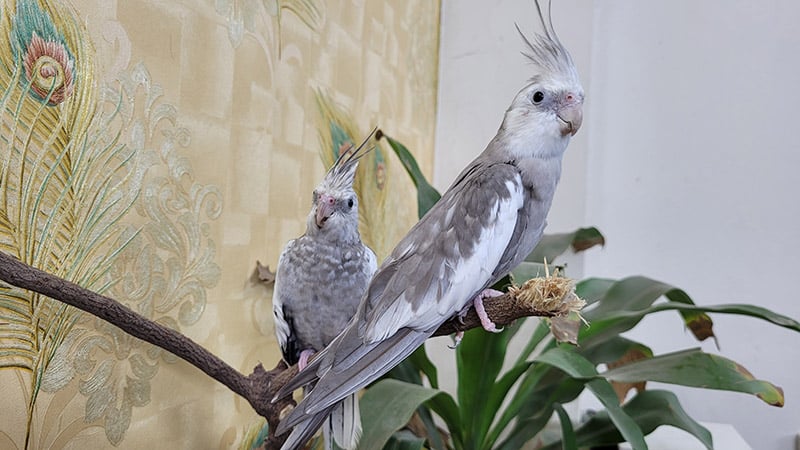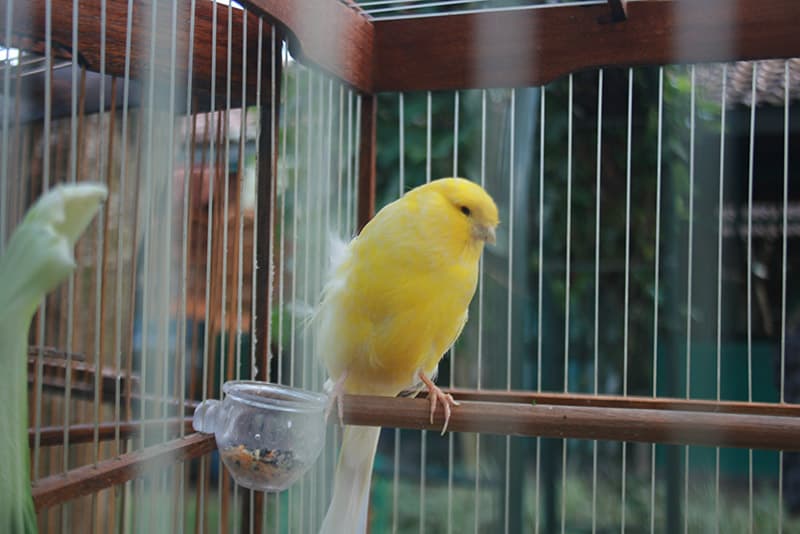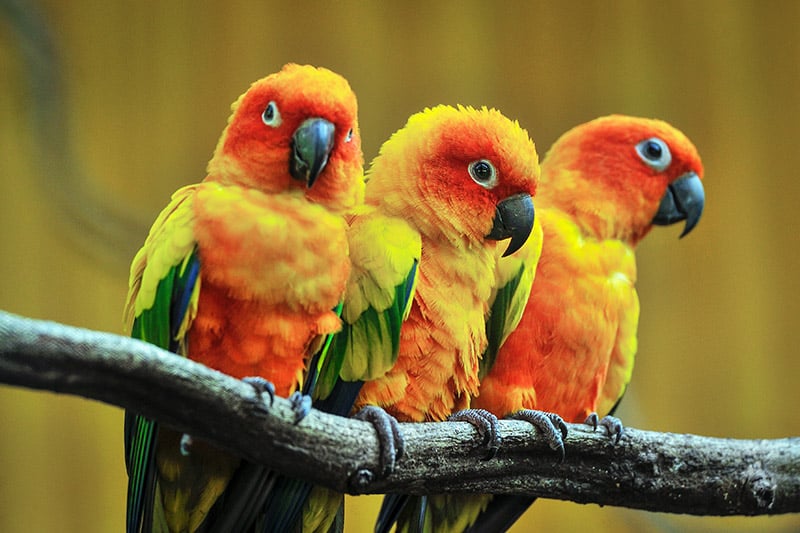Birds can make wonderful pets. They come in many gorgeous colors and have great personalities. They are also quite hardy and many can live a very long time. Bring a pet bird into your home and you will have a loving, social companion that can talk up a storm, or fill your home with a beautiful song. Birds simply make great pets!
There are many different types of birds that make great pets. Choosing a pet bird is a composite of many factors. Gather bird information about all the different types of pet birds. Then analyze what you want from a bird and what you’re willing to work with in a pet. Putting these together will help you determine which type of birds will fit into your household and lifestyle.
As you learn all about the different types of pet birds, you’ll quickly start figuring out which bird species you really like. You may fall in love with a particular bird for its color, or maybe you really want one that you can train to talk or perform tricks. Maybe you just love to listen to birds, or want to watch their crazy antics.
Each bird species is unique in characteristics and behaviors. Some birds like handling, yet others are simply fun to watch. Some are great talkers while others have a beautiful song. There are exotic pet birds that are loved because they are very colorful, with others are enjoyed because they are full of antics.
Knowledge of the characteristics and behaviors of different types of birds is invaluable in choosing the right pet bird. But the right bird is also one that will fit into your household and lifestyle. Do an in-depth analysis of you and your family and take a close look at the space in your home and yard. Now ask yourself, what bird is right for me? When you are ready to get your first pet bird, putting all this information together gives you the tools to help you make the right pet bird decision.
- As a starting point for choosing a pet bird, see: Bird Information: About the Types of Birds
Pet Birds
There are many bird species, and each one has different aspects that will affect your pet decision. As you spend time gathering information on the different types of birds, you’ll become familiar with these characteristics. You’ll want to know what bird behaviors to expect from the bird you choose as a pet.
- Life Span of Birds
Birds are some of the longest-living pets. Small birds can live anywhere from just a couple of years (like some of the finches) up to a few years or a couple decades (small parrots like lovebirds and parakeets). On the other hand, some of the largest parrots can live for many decades. A pet bird may outlive its first human companions. Today many parrots are included in wills or estates to be passed on to the children or heirs of the pet owner.
- Bird Traits
When choosing a pet bird you can expect your pet to demonstrate the traits of its family or group. Yet one of the most important things to keep in mind is that each bird is an individual. Your bird will have its own set of personality and behavioral traits.
Some of these traits will be the result of its upbringing, being either a hand-fed bird or a wild bird. Other traits it will learn. Learned traits reflect its environment and its relationship with its human companions, as well as its needs.
Learned traits include talking and performing tricks, but they can also include biting, screaming and feather plucking. Before you buy pet birds, gather as much bird information as you can so you will be able to provide the right setting and promote desirable traits.
- Bird Behaviors
Each different type of pet bird has unique characteristics and behaviors. There are as many behaviors in birds as there are colors. The most common things people look for in a pet bird include talking, performing tricks, singing, and birds that are simple full of antics and fun to watch.
Look through this list of characteristics and determine which ones are most important to you, but also decide what behaviors you can put up with:- Lots of parrots, and a few other types of birds, can be are great talkers.
- Many birds like to be handled, and some even like to be cuddled.
- While some of birds enjoy handling and interacting with you, others just want to stay at a distance while they talk and/or play.
- Some birds only like one person and others like everybody, and some birds only like women or only like men.
- There are also many pet birds that are not generally handled, but are simple wonderful to watch.
- Exotic pet birds are loved because they are very colorful or have exotic plumage, with others being enjoyed because they are full of antics.
- Some types of birds prefer to live with other birds rather than in a home, and these will thrive best in an aviary.
- Some small birds that are not usually handled, like canaries and varieties of finches, can do great in a small indoor cage.
- Many pet birds make noise. Some are very quiet, while others can be very loud. Be sure to think about how much noise you can tolerate.
For in-depth information on different types of birds, see: Bird Care Sheets: Bird Families – Bird “Groups”

What is the Right Bird for Me?
Living with birds can be a very rewarding experience, or a great frustration. You’ve determined which characteristics in a bird are important to you, now think about your household and your lifestyle. Think about your desires, needs and temperament. Putting you and the bird information you’ve gathered together will help you determine which bird will make the right pet bird for you. Before getting a bird, here’s some things to consider about you and your family.
- Your Lifestyle
When choosing a pet bird ask yourself some common sense questions. Getting a bird is a big commitment, not only on a daily basis but also for many years. Some birds can outlive you! Ask how much time do you want to devote to your bird (or birds!),
- Your Bird Experience
Another important consideration is how experienced you are with birds. It is often best to start with one of the small hardy birds until you feel comfortable and ready to take on a more demanding type of bird. With the bird information you’ve gathered, you will be adept at choosing a pet bird that suits your level of experience now.
- Living with Birds
Getting a pet bird is not only an investment, but living with birds will change you life. You’ll want to make sure you are ready. Consider these things to provide a good home for your pet, and ensure a rewarding experience for you too.- Time
Pet birds are often very social and all birds will take some time. They take time not only in daily maintenance, but also need interaction and play. Very social and active birds need much more time and attention than those that are shy or reserved.
Taking time with your bird everyday promotes a happy pet and a great friend. This time is also well spent to keep you aware of what’s going on with your bird. You’ll know if anything needs to be fixed or changed, and be on top of it becomes a problem. - Money
Decide in advance how much money you can invest in your new pet. For example, a large parrot will require a much more expensive habitat, more food, as well as many more toys and treats than a small finch. Also that maintaining a happy, healthy bird will be an ongoing expense for its entire life span. - Space
Determine how much room you have and what kind of space you can provide not only for a cage, but also for a play and exercise area. All birds will need daily care and regular maintenance, but on top of that, other characteristics can require even more involvement on your part. Some birds need a more diverse diet than others, and birds that are trained will need specialized treats. Birds that are handled require interaction on an everyday basis. Those that are extremely snugly must be provided lots of cuddle time and preening each day. Very active birds need new toys and chews provided regularly.
- Time
To provide the best environment for your bird, see: Bird Care: How to Take Care of a Pet Bird

Birds for Sale
There are birds for sale that can suit just about every type of person, and every type of lifestyle. Once you’ve picked the right bird for you, you’ll need to find and purchase it. Finding birds for sale is relatively easy for many popular birds, but can be more challenging for more unique bird species. Here’s a list of different places where you can find birds for sale:
- Finding birds for sale
All these resources can help you track down the type of bird you want:- General pet stores are a great place to get familiar with the types of birds that are readily available.
- There are also pet stores more bird dedicated. These will carry a more diverse variety of birds for sale.
- Bird specialty stores that have only birds for sale will have an even greater variety.
- Other places to see and learn about birds are bird clubs, bird organizations, bird farms, and bird breeders.
- Birdtalk Magazine not only has great articles about different birds, but carries advertisements and classified ads from breeders and others who sell birds.
- How to Buy Pet Birds
When you are ready to buy a pet bird, the bird should be checked for the following:- Make sure the bird is breathing well (not wheezing or straining).
- Eyes should be clear and clean.
- Feathers should be shiny with no bare spots.
- The bird should be alert and aware.
- Feel the bird’s breast bone to check its weight. A protruding breast bone means the bird is underweight and could be ill.
- Handle the bird to make sure it likes you.
- Always request a complete bill of sale and make sure you can return the bird if your vet determines it’s not healthy.
Featured Image Credit: Yatra4289, Shutterstock
